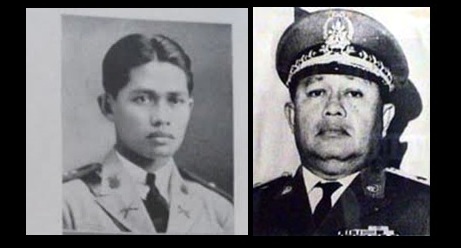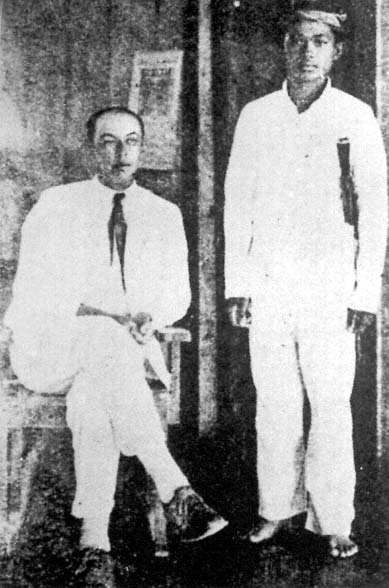Datu Salipada K. Pendatun
“Why should I join Fertig? I have my own bamboo telegraph, radio station and my own army, My soldiers have plenty of guns, and they know how to use them… Come with me, and I’ll show you how Pendatun deals with the enemy!”
So raged the imposing Salipada K. Pendatun in his booming voice. He had just been informed by MacArthur’s trusted delegate, Chick Parsons, that he was to assume the rank of Major under the command of Col. Fertig of the 10th Military District. The great Datu, commander of the largest guerrilla force in Mindanao which was composed of an impressive number of Muslim chieftains as well as several Christian irregulars, fairly bristled at the thought. Had he not after all, been elected by his own men to the rank of Brigadier General after he succesfully led them in an attack against the Japanese garrison in Pikit, Cotabato in August of 1942? Besides the gringo Fertig was not even a “real military man” while “Sali” Pendatun was the reserve officer who had the command of the skeleton 118th Regiment.
An earlier attempt to bring his forces into the 10th MD by Fr. Edward Haggerty and Lt. Col. Robert V. Bowler failed and thus, Commander Chick Parsons himself had to go to Pendatun’s headquarters in Bukidnon in May 1943. Accompanied by a guide and armed with sweet words of reason to persuade the proud guerrilla, Parsons did not expect to witness the Moro force in action.
About a thousand of his men were on their way to the provisional capitol of Malaybalay to attack the Japanese garrison. Chick said nothing further, in order not to hurt the datu’s pride. He joined the followers of the Muslim chieftain to Malaybalay, and when he saw the Japanese entrenchment behind concrete walls of the local school building, he tried to dissuade Sali from making the attempt. Sali did not have the big guns, the artillery, to demolish the cement walls and open a breach for his men to rush in.
“even if you knock out this particular garrison,” Chick added, “far larger enemy forces will soon appear. They’ll revenge themselves not only against your men but also the civilians who live in the vicinity.”
But Pendatun had made up his mind. “My soldiers have already blown up bridges between Malaybalay and the next Japanese garrison in Cagayan, some 80 kilometers away. There will be no retaliation – we are too strong for them. When we have finished with them in this province, we will attack Cagayan itself. And after that, Davao! Eventually, I intend to free the entire eastern region of Mindanao from the Japanese!”
After the men had the school surrounded, Pendatun gave the order to fire. Rifle bullets either bounced off or chipped the cement. They heard the Japanese hooting in derision. The enemy then let loose a few rounds of machine gun fire, but the guerrillas were well hidden behind trees and mounds that surrounded the area.
“prepare the bombs and catapults,” shouted Pendatun, somewhat embarrased. The bombs and catapults consisted of inner tubing of automobiles and bamboo poles that hurled beer bottles filled with gasoline. The bottles splashed the gasoline on the walls but failed to penetrate the interior of the building.
“A few American mortars, a bazooka or two, perhaps a small field piece, such as SPYRON will deliver to recognized guerrilla commanders,” said Parson quietly. He did not finish the sentence, because he was sure that Pendatun had heard his remark.
Pendatun was visibly embarrassed. He made a final effort, “Bring the airplane bombs,” he ordered his subordinates. Some of the soldiers ran into the jungle and brought back 50 and 100 pound aerial bombs.
“where in heavens did you get those?” Chick inquired.
“I told you I have everything,” boasted Pendatun. “My men got the bombs from the abandoned airfield of the USAFFE, We have dynamite detonators too, taken from the gold mines in Agusan, Now, Commander, you will see how we can knock a hole in that building.”
The regular aerial detonators were removed and those intended to explode the powder were inserted. A safety fuse was added to each bomb. The guerrilas crouched low and carrying the bombs ran towards the building but could not get near because of the machine gun fire of the enemy. The rubber catapults were not powerful enough to lob the 50 pound bombs into the air. The attack has reached a deadlock and, for perhaps an hour, neither side could make headway. Then some subordinate whispered to Sali. He nodded, and Minuites later a carabao or water buffalo was brought outside the range of enemy fire. A 100-pound was securely tied to each side, the fuse lit, a sheaf of straw tied to the animal’s tail and set on fire. The creature ran straight towards the cement wall, and the bombs exploded just as it reached the walls. Nothing was left of the animal, but a gaping hole had been made.
The Moro guerrillas shrieked as they advanced. The Japanese inside tride to escape to the rear but were cut down by the moro’s trusty kris and kampilans. (excerpts taken from the book: Chick Parsons, America’s master spy in the Philippines)
Parsons was won over by the grudging admiration while Sali reconsidered his hardline stand. His pride and prejudice had to give way to utilitranism if he were to if he were to look after the interest of his followers. His outfit must be recognized by MacArthur for his men to receive the backpay due to them after the war. So the next day, the 117th Regiment came into being. Assigned to the Bukidnon-Lanao-Cotabato area where he and Fertig need never to cross paths Maj. Salipada K. Pendatun cheerfully informed Parsons “I will serve under MacArthur.” And with much aplomb, he did. (Ma. Theresa B. Arpa)
SALIPADA K. PENDATUN
(1912-1985)
Foremost Mindanao Lawmaker and Military Leader, Salipada K. Pendatun, a distinguished military officer and politician, not only had royal blood but also was a descendant of a great religious leader- the prophet Mohammed no less. His lineage could be traced thus: The sultan of Johore was a direct descendant of the Prophet Mohammed. One of the sultan’s sons, Shariff Kabungsuan, was the first to bring Mohammedanism to the Philippines. From him descended Rajah Boayan and later, Datu Ante Pendatun. Datu Ante, the Sultan of Barongis, would go on to marry a woman from a class of Tupo nasapi, or “old Brahmans,” who acknowledged no datus. This union brought forth a son, named Salipada K. Pendatun. Pendatun was born on December 3, 1912 in Baggio Kudal Pagalungan, Pikit, Cotabato, but his real date of birth was changed on purpose in 1946 to December 3, 1910 to enable him to run for a seat in the Philippine Senate in the first postwar elections. His father died when he was 11, the age he started going to school. Before that, because he preferred to spend his time hunting than attending classes, his father had a man-to-man talk with him, explaining the importance of education to a leader. He was, after all, a datu. Thus, he pushed himself and, with much enthusiasm and brilliance, finished the elementary grades in just three years. He also associated well with the other school children, showing an ability to lead that gained the notice of school officials, specially his teacher.
Although the Pendatuns were relatively well-off before Datu Ante died, the family did not have much property left when it was time for him to study in high school. This compelled him to seek the help of Edward M. Kuder, the division superintendent of schools in Cotabato, who had once taken note of his potential for leadership. After stating his purpose, he agreed to have Kuder take him into his household in exchange for his free schooling. Thus began the long association between them.
While in high school, Pendatun was active in military drills. It was therefore no surprise that, when Kuder asked him what he wanted to become, his response was forthright: to be a constabulary officer. Kuder advised him, though, that he could better serve his fellowmen by studying to become a lawyer. As a compromise, he tried to work at being both.
In 1932, Pendatun enrolled at the college of liberal arts of the University of the Philippines. While taking up pre-law, he went through the mandatory ROTC course for two years. Two years later, he entered the college of law. At the same time, he pursued the advanced ROTC course, and eventually became an officer in the UP Cadet Corps. Before graduating, he received his commission as a third lieutenant in the Philippine Army Reserve Force. He took time out from college to attend the officer’s course at the Reserve Officers Service School. Not long after, he went back to law school. At one point, he tried to help his Muslim brothers acquire titles to their lands before these were encroached upon by ever increasing numbers of settlers from Luzon and Visayas availing of the government’s resettlement program. Fearing the irrevocable loss of Muslim patrimony, Pendatun urged the American vice governor to appoint officers to aid Muslims in registering their lands. Unfortunately, his gallant attempt was not so successful.
In 1938, he graduated from law school and passed the bar. That same year, at the age of 26, he was appointed by President Quezon as Cotabato provincial board member, a position to which he was later elected in 1939. His political career was interrupted when he was called to active military duty at the outbreak of the Second World War. He had been inducted into the United States Army Forces in the Far East several months earlier, in September 1941. While serving as assistant S-3 (plans and training officer) of the 101st infantry regiment, Lieutenant Pendatun realized the need for more men who would take up expected defensive operations. He proposed the creation of Moro units, composed of Moslem volunteers, for his purpose. After carefully considering his proposal, the commander of the 101st division, General Vachon-believing that Moros were just as patriotic as their Christian brothers- directed the formation of Moro bolo battalions along the lines recommended by Pendatun. Pendatun rose in rank. From lieutenant, he became lieutenant colonel and, later, full colonel. He closed his glorious military career with the rank of brigadier-general, the first Muslim to attain such a high rank in the Armed Forces of the Philippines. His war exploits earned him 32 decorations and medals from both the Philippine and US governments.
After World War II, he was named provincial governor of Cotabato. He was elected senator in 1946. He served as President Quirino’s technical adviser from 1951 to 1953. He practiced law from 1953 to 1957. In 1957, he became a congressman for Cotabato. He again won a Senate seat in 1969. He served as senator until 1973. From 1967 to 1972, he was a ranking member of the Commission on Appointments. He represented Cotabato as an assemblyman at the Interim Batasang Pambansa, where he eventually became speaker pro-tempore.
On the night of January 23,1985, Pendatun was seriously injured in a vehicular accident. At first declared out of danger after a four-hour operation, Pendatun died several days later, on the morning of January 27. He was 72.






